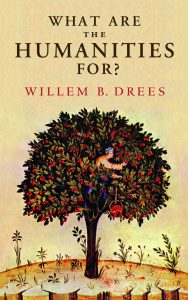
‘For the Study of’: A one-sided agenda on religion and science?
By Willem B. Drees
Is it significant that the name of the International Network for the Study of Science and Belief in Society has explicitly ‘for the study of’ in the name? It might be merely a smart move in a secularized academic context, where engagement with religious convictions is more easily accepted if the beliefs of others are the object of study, rather than seen as convictions that academics might argue for, convictions that we ourselves may have.
The phrase ‘for the study of’ might also signal that a particular disciplinary horizon for research on religion in its relation to the natural sciences, one which includes social and historical dimensions and functionality, but excludes scientific insights and theological convictions as substantial claims, that scientists, theologians, and others might argue about.
In contrast, the main body of literature on religion and science, represented by esteemed authors such as Ian Barbour, Arthur Peacocke, and John Polkinghorne, but also by opponents such as Richard Dawkins, tends to pass by social-scientific studies of science and of religion. The focus on substantial issues is expressed in the names of various organizations and journals. In 1954, concerned scientists and religious leaders founded the Institute on Religion in an Age of Science (IRAS), to advocate for religious and societal reform. The first editorial of Zygon: Journal of Religion and Science, in 1966, explained the name Zygon as “a symbol for this journal whose aim is to reunite the split team of values and knowledge, where co-ordination is essential for a viable dynamics of human culture.” In the 65 years it has existed, the journal has become more purely scholarly, less driven by this particular agenda. The Center for Theology and the Natural Sciences in Berkeley, founded in 1981 by Robert J. Russell, has as its central scientific focus “developments in physics, cosmology, evolutionary biology, and genetics.” Religiously far more liberal, but equally convinced of the importance to work with the best available scientific insights is the Religious Naturalist Association (RNA), founded in 2014: “We ask ‘What is?’ and ‘What matters?’ questions, seeking answers from natural (rather than supernatural) resources.” The International Society for Science and Religion (ISSR, 2002), has among the criteria for fellowship “Excellent standing in one of the relevant areas (science, religion, philosophy) together with sustained interest in or support for the science/religion debate.” The focus tends to be on substantial issues – on science and on theology, rather than on believers and their beliefs.
An exception seems to be the name of ESSSAT, the European Society for the Study of Science and Theology, founded in 1988. “ESSSAT is a scholarly, non-confessional organization, based in Europe, which aims to promote the study of relationships between the natural sciences and theological views.” There the ‘for the study of’ serves to keep a distance from alignment with a particular church, but not thereby from substantial issues in science and in theology: Thus, there is room for a Network ‘for the study of’, as it is different with the disciplinary emphasis on historical, cultural and social scientific studies.

However, is ‘for the study of’ all we need? There seem to be two different scholarly discussions. One discussion is about ideas, whether scientific or religious, where people argue about which ideas they might adopt. And there is one in which people having such beliefs are the objects of study, as in science studies and in cultural studies, sociology, and the like. In my new book What Are the Humanities For? (Cambridge University Press, 2021), I argue that the co-existence of academic distance and personal engagement is characteristic of the humanities as self-engaging knowledge, and not merely an issue related to theology and religion.
In this context, philosophy might be a mediating discipline, between personal and intellectual engagement, the insider interest, and an outsider perspective. Philosophy of science has been arguing for the intellectual standing of science, the objectivity and rationality of its insights, while taking into account that humans, in particular historical conditions, produced those sciences with particular personal interests and biases. While the philosophy of mind seeks to understand how we humans can be driven by ideas and convinced by arguments, while the work seems to be done by the make-up of our brains. Political philosophy mediates between normative political discourse and political sciences, as the study of political processes, structures and beliefs. Philosophy of religion draws on religious studies, ‘the study of beliefs’, but argues about their potential meaning, value and truth. Should this Network be committed exclusively to an outsider perspective, one that is not partisan but data driven, as would be the aspiration of social sciences such as sociology, psychology and anthropology, and humanities disciplines such as history? Merely seeking to understand what those beliefs humans have meant to the humans that have them, and the society to which those humans belong? In practice, some of those involved in ‘the study of’ beliefs may have substantial preferences, and would like to advocate them, e.g. when studying vaccine hesitancy to understand it, but also to overcome such resistance, as they advocate the acceptance of science-based public health measures. More generally, those who study the beliefs of others are humans too. This is typical of the humanities – as studies are done by humans, and not by dogs or aliens. We come to understand ourselves in the light of what we learn about others, whether by contrasting our rationality with those we study or by considering those whose beliefs are studied as exemplary.

Willem B. Drees is emeritus professor of philosophy of the humanities, Tilburg University, and of philosophy of religion, Leiden University, the Netherlands. He served as president of ESSSAT, the European Society for the Study of Science and Theology (2002-2008) and as the editor of Zygon: Journal of Religion and Science (2008-2018). For more about Willem’s work see his profile on our Researcher Directory.
